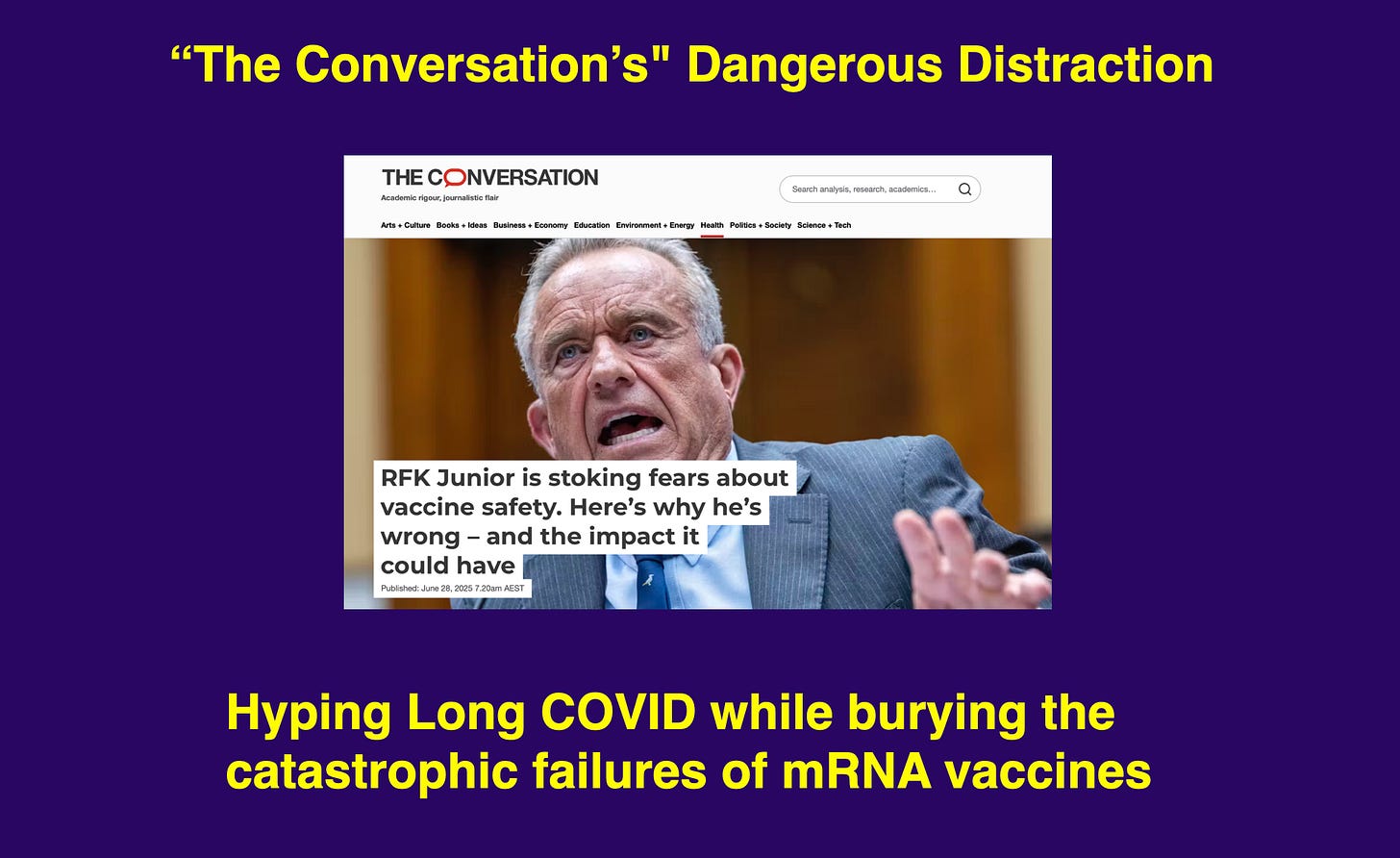Response to "The Conversation's" dangerous distraction.
Hyping Long COVID While Burying the Catastrophic Failures of mRNA Vaccines
The Conversation's Dangerous Distraction: Hyping Long COVID While Burying the Catastrophic Failures of mRNA Vaccines
In a recent article published in The Conversation, authors from Deakin and La Trobe Universities paint a harrowing picture of long COVID, equating its impact on quality of life to that of stroke or Parkinson's disease based on self-reported surveys from a mere 121 Australian participants. They decry the condition's "profound" effects on daily activities, calling for urgent rehabilitation and support services to combat what they frame as a debilitating crisis. While acknowledging the real suffering of those with lingering post-infection symptoms, this narrative serves as a convenient smokescreen—one that diverts attention from the far more insidious scandal: the mRNA COVID-19 vaccines themselves, which have inflicted widespread harm, offered fleeting and underwhelming nonprotection, and been oversold to the public with reckless abandon.
The Conversation's selective outrage, focusing on infection aftermath while tiptoeing around vaccine-induced horrors, exemplifies the media's complicity in a public health fiasco that has eroded trust and endangered lives.Let's be blunt: the mRNA vaccines from Pfizer and Moderna aren't just "imperfect"—they're a public health disaster, riddled with the most serious adverse events that regulators and outlets like The Conversation have systematically downplayed. A peer-reviewed re-analysis of the original clinical trials reveals an excess risk of serious adverse events of special interest (AESIs) at a staggering 12.5 per 10,000 vaccinated individuals. This isn't minor inconvenience; we're talking coagulation disorders, cardiac injuries, and neurological damage; harms that were baked into the rushed rollout and dismissed as "rare" by proponents. The Conversation's article, with its emphasis on long COVID's disability scores, conveniently ignores how these vaccine risks mirror or exceed the very symptoms they lament, all while failing to mention vaccination as a potential trigger for similar syndromes.
Take myocarditis, the heart-inflaming elephant in the room. In a massive Nordic study of over 23 million people, young males aged 16-24 faced 4-7 excess cases per 100,000 after Pfizer doses and a shocking 9-28 after Moderna; concentrated after the second shot or boosters. Follow-ups reveal lingering cardiac scarring in many, with unknown long-term consequences that could haunt a generation. Mechanistically, it's damning: adolescents with vaccine-induced myocarditis show detectable full-length spike protein circulating in their blood weeks later, absent in controls; a clear sign of the vaccine's engineered payload gone rogue. Yet The Conversation waxes poetic about long COVID's "brain fog" and fatigue without a whisper about how these vaccines might be inducing parallel neuropathies. Small-fiber neuropathy, a painful nerve disorder, has emerged in case series post-vaccination, with reports from 2023 to 2025 documenting persistent symptoms that cripple daily life. And don't forget postural orthostatic tachycardia syndrome (POTS), where the risk spikes after vaccination, albeit lower than post-infection; but still a needless burden imposed on healthy people under the guise of "protection."
Even the adenoviral vectors like AstraZeneca's aren't spared, with established links to thrombotic thrombocytopenia syndrome (TTS) or vaccine-induced immune thrombotic thrombocytopenia (VITT), carrying high fatality rates in early deployments. Policy shifts in places like Australia were forced by these deaths, yet The Conversation's latest piece treats long COVID as the ultimate villain, sidestepping how vaccines have created their own wave of "long-vax" victims—people with multi-system symptoms like dysautonomia and neuropathy, backed by Yale preprints and mechanistic clues like persistent spike antigen.
On effectiveness, the story is equally grim. These shots were hyped as transmission-stoppers, but against Omicron and its descendants, protection against infection is pathetic and ephemeral. Household attack rates stayed high, and vaccine effectiveness (VE) against symptomatic illness fades rapidly. Even against severe outcomes, the XBB-updated versions offer only moderate, waning benefits—mostly in the elderly and high-risk, with VE dropping over months. For low-risk groups, including the young males hammered by myocarditis, the risk-benefit calculus is upside-down. Calling them "ineffective" isn't hyperbole; it's an indictment of policies that have mandated these jabs, ignoring subgroup harms and variant drift.
The Conversation's article, while advocating for long COVID sufferers, perpetuates a one-sided narrative that absolves the vaccines of scrutiny. By comparing long COVID to stroke or Parkinson's via questionnaire data—without delving into neuropathological parallels or vaccine contributions; it fuels fear of the virus while whitewashing the interventions that failed to deliver. This isn't journalism and science; it's propaganda, minimising real harms like menstrual disruptions in large cohorts and unresolved "post-vaccination syndromes" that demand accountability. It's time to stop the charade. The mRNA vaccines are risk-laden failures, foisted on billions with exaggerated promises and inadequate safety nets. Regulators must mandate age- and sex-stratified risk assessments, transparent informed consent, and robust support for vaccine-injured individuals.
Outlets like The Conversation owe the public better than selective empathy—start by confronting the full truth, not just the convenient parts. The real pandemic now is one of eroded trust, and pieces like this only deepen the wound.
Ian Brighthope



The authors:
Julie Leask receives research funding from NHMRC, WHO, US CDC, NSW Ministry of Health. She received funding from Sanofi for travel to an overseas meeting in 2024. She has consulting fees from RTI International and the Task Force for Global Health.
Catherine Bennett has received honoraria for contributing to independent advisory panels for Moderna and AstraZeneca, and has received NHMRC, VicHealth and MRFF funding for unrelated projects. She was the health lead on the Independent Inquiry into the Australian Government COVID-19 Response.
"Let's be blunt: the mRNA vaccines from Pfizer and Moderna aren't just "imperfect"—they're a public health disaster, riddled with the most serious adverse events that regulators and outlets like The Conversation have systematically downplayed."
Let's be blunter. There are 20 million dead a much higher # disabled. There is no "long" covid.
There is partial disability and worse. None are safe, none are effective / All are harmful, Some Genocidal There are countless details